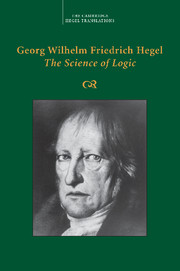Chapter 2 - The Essentialities or the Determinations of Reflection
Published online by Cambridge University Press: 30 September 2021
Summary
Reflection is determined reflection; accordingly, essence is determined essence, or it is essentiality.
Reflection is the shining of essence within itself. Essence, as infinite immanent turning back is not immediate simplicity, but negative simplicity; it is a movement across moments that are distinct, is absolute mediation with itself. But in these moments it shines; the moments are, therefore, themselves determinations reflected into themselves.
First, essence is simple self-reference, pure identity. This is its determination, one by which it is rather the absence of determination.
Second, the specifying determination is difference – difference which is either external or indefinite, diversity in general, or opposed diversity or opposition.
Third, as contradiction this opposition is reflected into itself and returns to its foundation.
Remark
The determinations of reflection have customarily been singled out in the form of propositions which were said to apply to everything. They were said to have the status of universal laws of thought that lie at the base of all thinking; to be inherently absolute and indemonstrable but immediately and indisputably recognized and accepted as true by all thought upon grasping their meaning.
Thus identity, as an essential determination, is enunciated in the proposition, “Everything is equal to itself; A = A,” or, negatively, “A cannot be A and not-A at the same time.”
On the face of it, it is difficult to see why only these simple determinations of reflection should be expressed in this particular form and not also the rest, such as the categories that belong to the sphere of being. We would then have, for instance, such propositions as, “Everything is,” “Everything has an existence,” etc.; or again, “Everything has a quality, a quantity, and so on.” For being, existence, etc., are as logical determinations the predicates of everything in general. A category, according to the etymology of the word and Aristotle's definition of it, is what is said and asserted of every existent. – But the difference is that a determinateness of being is essentially a transition into the opposite of it; the negative of every determinateness is just as necessary as that determinateness itself; as immediate determinacies, each determinateness immediately confronts the others.
- Type
- Chapter
- Information
- Georg Wilhelm Friedrich Hegel: The Science of Logic , pp. 354 - 385Publisher: Cambridge University PressPrint publication year: 2010

